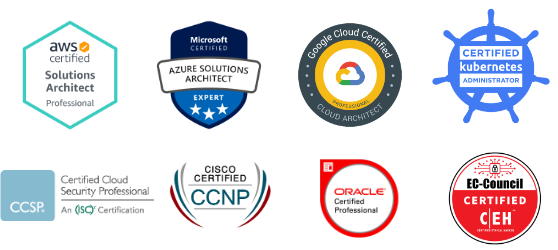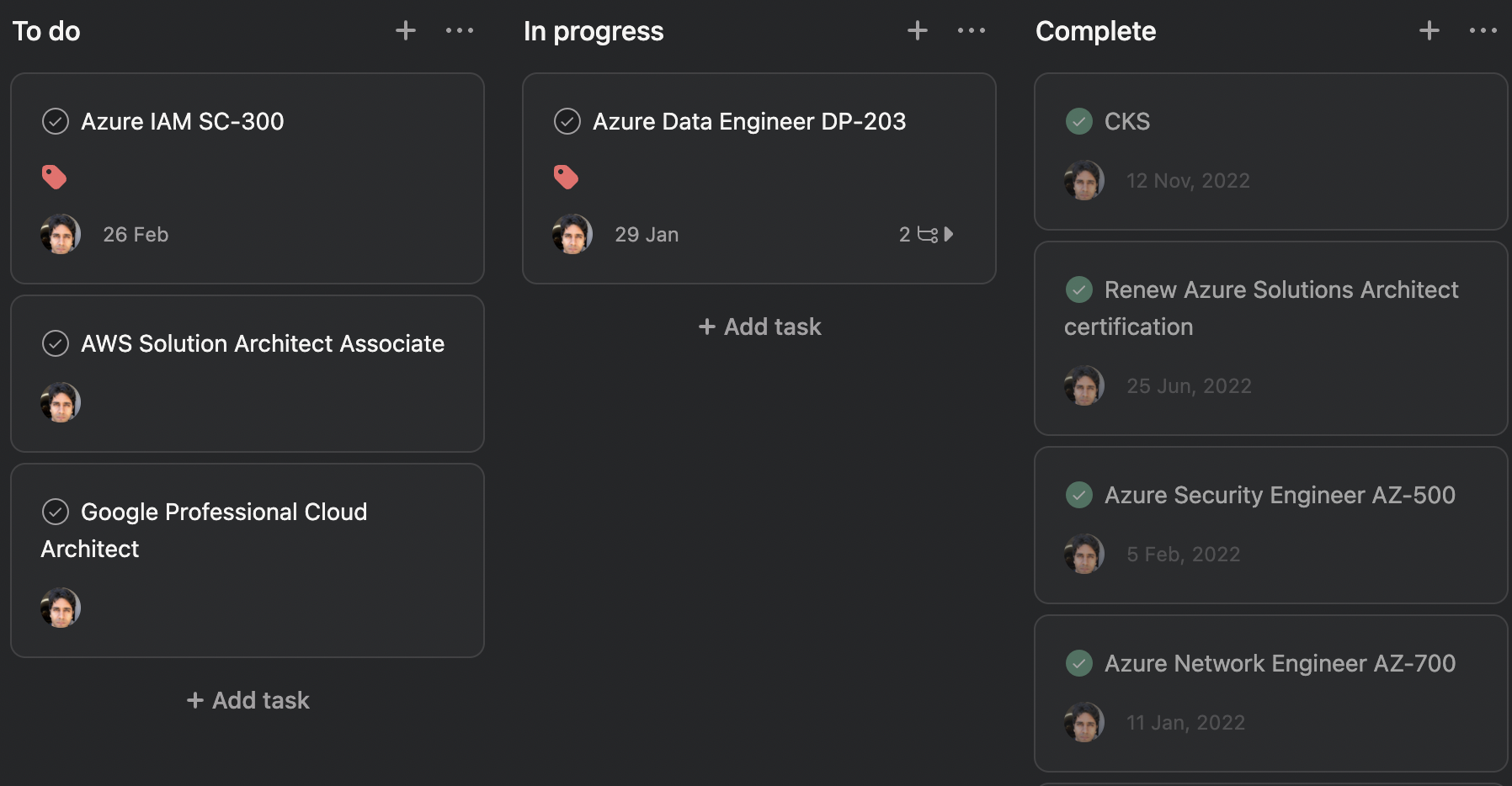Creating a certification plan
Written on January 10, 2023
Estimated reading time :
6 mins
I started my certification journey quite late in my career. I followed the top certified folks on LinkedIn for a while to see if I could learn from their stengths as also mistakes. Some of the questions which I am looking to answer :
- What are the pros/cons of certifications ?
- How do I go about it ?
- Does it make sense to go for multiple certs ?
Lets dig deeper into the topic !
- When certifications can help
- When certifications can be a problem
- Developing a balanced plan
- Example
Plenty of certs out there…

When certifications can help
Marketing yourself
- Certifications help in marketing yourself as they make your digital profile stand out.
- Additionally job profiles posted by top companies like Amazon, Google, Microsoft etc often mention it.
Getting a structured introduction to a new workstream
- Certifications can be a well structured way to learn the concepts for new upcoming work.
- Eg : For an Azure data analytics project, studying for the Azure Data Engineer cert can give you a good intro into the Azure tools for processing data.
- If you are already experienced in a workstream, then it will be easier to get a related certification.
Knowledge is power
- The journey is often better than the destination. Studying for a certification gives you tiny nuggets of knowledge which you wouldnt have gained otherwise.
- Knowing the theory helps in having a variety of insightful conversations with others.
- Some certifications like those for Kubernetes are very practical in nature and require you to solve problems using k8s cli commands. Studying for it automatically gives you handson experience.
- Merely the act of pursuing certifications can help you to form a routine focused around gaining knowledge.
When certifications can be a problem
Giving you a false sense of confidence
- Half knowledge is dangerous. Certified folks with not much handson experence can be like those new to the job - full of confidence of what they know but no idea of what they dont know.
- Certifications cannot replace practical experience. The confidence and attention to detail that comes from practical experience can never come from clearing an exam.
Not making the best use of your time
- We all have limited time. Focusing on certifications which arent useful anytime soon are a waste of time.
- Certifications have a fair bit of maintenance time too as most of them need to be renewed in 1/2/3 years.
- Aiming for all the certifications of a specific cloud may seem like a great advertisement for your profile but its very redundant and seems like an attempt to get validated by others.
- Eg: Folks maintaining a cloud expert cert as well as the fundamental one even though its redundant.
- Having a variety of certs can give a sense of a “Jack of all trades” profile. Not ideal when we have many experienced job postings out there requiring specialist skills.
- Maintaining a lot of certifications leads to sacrificing time from somewhere else - health, work, family or other avenues of tech community contribution(Open source contributions, technical blogs, knowledge sessions, StackOverflow posts etc).
Developing a balanced plan
Let your career direct your certification plan
- Do NOT go for every certificate out there. Spend some time to plan the next 3 years of your career.
- Eg: To become a multi cloud engineer, you will have to gain relevant experience by working on them. Studying for certs on the relevant clouds will help you on this journey.
- From cryptocurrency to AI to metaverse - Cloud technology is here to stay for a number of years. But other software may or may not be as stable as things change a lot in technology. So atleast plan the next one year of your career.
- Start with a goal for the year. Focus on a single cert then take it from there.
- Instead of breadth, aim for a depth of certifications. Assuming you have some practical cloud exp, 2-6 cloud certs are enough for mastering a cloud as long as they are specialised certs.
- For going deep into one cloud, go directly for the associate level cert. If you are new to the cloud and dont plan on going deep anytime soon then only go for the fundamental cert.
- Eg: For Azure, the Azure Solutions Architect cert showcases your all round Azure cloud knowledge while the specialised Azure certs like Data Engineer, IAM Engineer, AI Engineer etc help you gain specific skillsets on the cloud.
Have SMART goals
- SMART is an acronym that stands for Specific, Measurable, Achievable, Realistic, and Timely.
- Once you have zeroed in on the certs matching your goals, commit to each cert with end-dates.
- Eg : For an infra engineer experienced in k8s looking to begin his/her k8s certification journey on Jan 1 2023, the checklist could look like this :
- CKAD
- Udemy course(15 hrs) : Jan 15 (Assume it will take 30 hrs for going through the course + some prctice : 5 hrs per weekend day + 1 hr per weekday).
- Official Practice test 1 : Jan 22 (Assume it will take you an extra week for revision).
- Official Practice test 2 : Jan 23.
- Certification exam : Jan 28.
- CKAD
Radiate your strengths well
- Your digital profile should highlight your strengths. A healthy mix of practical experience, contributions to the tech community and certifications are the best way forward.
- Relying purely on certifications to market yourself can make you a one trick pony and potentially highlight lack of depth in the other areas.
- If you arent benefiting from an existing cert then do NOT renew it. Especially if it takes significant time and effort.
- Dont forget to spend time on other endaevours too. Get cracking on that new tool you wanted to build. Enough of only being a consumer of StackOverflow…time to spend some time helping others on it. Time to mint a few blog posts with that deep expertise of yours
 .
.
Example
After working on the 3 major clouds, my current goal is to expand on my multi-cloud expertise. My 2022 cert goal was to go deep into Azure and k8s. My 2023 cert goal is to go deep into GCP and AWS.


